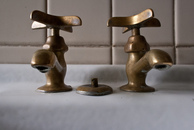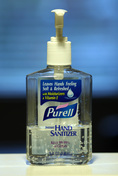Monofoil
I was contacted by the makers Coeus Technology, makers of Monofoil. I am very impressed with the product, so I asked if I could post about it because, unlike most germ killing sprays or wipes which kill the "current" germs, Monofoil continues to kill germs on the surface for a long time after being applied.
Monofoil is a revolutionary new antimicrobial product that uses a physical action as opposed to a chemical action in destroying microbes. This antimicrobial product is being used by area hospitals, schools, professional sports organizations, and theme parks. Countries like China, Saudi Arabia, and Australia have recently been introduced to this new technology. Monofoil destroys algae, fungi, bacteria, and viruses by attracting the harmful microbes to it. Then the cell membrane is pierced, bled out and then electrocuted. The technology of Monofoil enables the product to remain intact to the substrate it is applied to. Allowing it to stay in place for up to 30 days as continues to work time and time again. This ready-to-use product is available in gallons, spray bottles, and wipes. Coeus Technology has recently added to its product line a new laundry additive. Thus allowing the clothes we wear to be protected for up to 50 washes. Better yet, Monofoil is hypo-allergenic, non-toxic, and safe to use around children and pets. One of the benefits of using Monofoil is the cost effectiveness of the product. It is fairly priced when you consider how long it lasts you. No more need for us germaphobes to buy chemicals that can be harmful to humans and have no longevity anyway. Another benefit is in the way the antimicrobial works. The way it kills a microbe is unique in that it does not simply poison the cell, but destroys it. Most chemicals will poison or sicken the microbe, allowing it to adapt to the chemical. This is how a “superbug” is formed and is definitely life threatening. Not the case with Monofoil. This product completely eliminates the problem and sticks around to do it again. Monofoil is unconditionally registered with the EPA and is made in the USA. Coeus Technology is a Disabled Veteran Owned Small Business located in central Indiana. The partners who started the company are both from Indiana and have studied biology at Indiana University. Both also served in the military for their country. I am neither sponsoring nor endorsing their product. It just looks like a "game changer" to me. Related articles  The restaurant menu, doctor’s office magazines, and other public reading material. You think these are ever cleaned? Since cold and flu viruses can survive up to 18 hours on a surface, there’s a good chance those germs can get passed on to you. Don’t let the menu touch your plate or silverware, and wash your hands thoroughly before your food comes. Remember that the bathroom door handle isn’t the cleanest thing in the world, so when leaving the bathroom, open it while holding a clean paper towel. The grocery cart and basket. Think of all the hands that grip those handles. Eww. A 2007 University of Arizona study discovered that two-thirds were contaminated with fecal bacteria. Definitely pack disinfectant wipes with you and wipe the handles down before touching. Gym Equipment. If you belong to a gym, you might want to know that a 2006 study in the Clinical Journal of Sports Medicine found rhinoviruses (what cause colds) on 63 percent of the gym equipment at the fitness centers they tested. To avoid the germs, try not to touch your face, nose, or eyes while working out, and as soon as you’re finished, wash your hands and face thoroughly to prevent getting sick. Don’t touch the first floor elevator button. In an elevator, the first-floor button harbors the most germs. Watch escalator handrails – they are filled with germs Use the FIRST toilet – most people use the middle stall in public The office coffee pot drips with germs Hang on to your own coffee mug Your desk may be dirtier than the toilet. The typical office desk area has 400 times the amount of bacteria than the average toilet seat. Start your cleaning with your phone. Avoid hand shaking and kissing – well, at least make sure you wash your hands and practice good oral hygiene. HOTELS 1. Pack your own sheets. If you have any concerns about your hotel’s cleaning practices, pack a queen-size sheet to throw over the bedspread so you’re not exposed to dust mites, germs, or allergens lurking in the cover. 2. Pack a long-sleeved sleep shirt and long sleep pants. Again, if you are concerned about the hygiene of the bedding, reduce contact by wearing body-covering pajamas and light socks to bed. 3. Use your bed for sleeping only. Don’t do work on it, eat on it, and don’t watch movies or TV on it. Not only is that more hygienic, but you’ll likely find it easier to fall asleep that way. 4. Ask for an allergy-free room. Some hotels are now offering rooms that are built and furnished to minimize the amounts of dust mites and other allergens. Even if you don’t have allergies, this might be a good choice for people prone to colds and flus. Other hotels provide allergy packs, including face masks, special pillows, and mattress covers. But you have to ask for them. 5. Choose modern over old. Yes, Victorian bed-and-breakfasts are far superior in terms of charm and personal touches. But they also lead in the amount of allergens and dust you are likely to encounter in the rooms and public sitting areas. So if health is a real concern while traveling, go for good-quality modern hotels. In no particular order, here are some of the germiest items in a hotel room: remote control door handles light switches phone alarm clock pens faucet handles bed spread carpet Don’t feel like you can’t use any of these items, just use caution and common sense. Clean the remote control, phone, clock radio, door handles, and light switches. Don’t walk around barefoot: throw on a pair of slippers. And don’t use the bedspread if you can help it. Related articles
 Ever notice that there are more commercials advertising antibacterial gels and related products? Every time I step into a grocery store there are antibacterial wipes for my shopping cart readily available. Or how about when you are waiting in line at the checkout stand? Chances are there’s a bin full of antibacterial products nearby. At the place where I work, there’s a Purel dispenser at every door entrance. Is it excessive? No. I’ll be the first to admit that I’m a germaphobe. And if something as simple as a modified strain of flu can take several lives, that’s enough proof to me that we need to have these products available to us at all times. Here are some key locations to keep antibacterial products handy. In your pocket! Think about all the things you touch and share with other people during the week. At work you come into contact with a number of co-workers and customers. You probably share the majority of office supplies and equipment, including computers, photocopiers, staplers, pens, with the entire company. On your days off you’re probably out doing chores. You’re touching door handles, shopping cart handles, toilet handles sink faucets in public restrooms, ATMs, meat at grocery stores. If you want to prevent yourself from contracting an infectious microbe, one rule of thumb to follow is that you sanitize after you leave each place you visit. You can do this by carrying around a small bottle of antibacterial gel that you can fit in your pocket or purse. At your kitchen sink. If you do a lot of cooking at home, you want to disinfect your hands before you touch the food which you are about to serve yourself and others. That’s health 101. But here’s something else to think about. Imagine all the dirty dishes that you put into your sink. So, you have germs from both people’s mouths and from food particles that become exposed and start to rot over time. Now, think about the sponge that you touch every time you wash the dishes. Chances are you don’t swap out your sponges everyday. Microbes can live for days on moist surfaces, which your sponge most definitely is the majority of times. Make it a habit to rub your hands with some antibacterial gel after you wash your dishes, and you will greatly reduce your exposure to infectious germs. At or near your dining room table. Our mouth being our largest orifice, it is the easiest path for dangerous microbes to take to get into our bodies. There is a reason why our parents pestered us about washing our hands before we ate, they didn’t want you to swallow down these microbes with your food! And if you’re a parent, you probably pester your own kids about washing their hands before they eat. But as you know, kids will seldom oblige to this request the first time. You probably have to tell them multiple times, or physically force them before they do it. Or they’ll simply lie about it. Sometimes you may even forget to tell your kids. Moreover, you as an adult, will sometimes fail to wash your hands before you eat. By having an antibacterial gel dispenser at your table, you will ensure that you and your family will have clean hands right before you serve the food, in case someone forgets or you suspect is lying about it. Related articles
|
Not Medical Advice
Everything in this blog is for entertainment and information only. It is NOT medical advice. Do not consider anything as medical advice and check with your physician before you take any action from any of our posts.
Categories
All
Archives
March 2020
AuthorI'm not in medicine. I'm just a mild germaphobe sharing information that I find. Interesting Sites |
 RSS Feed
RSS Feed
